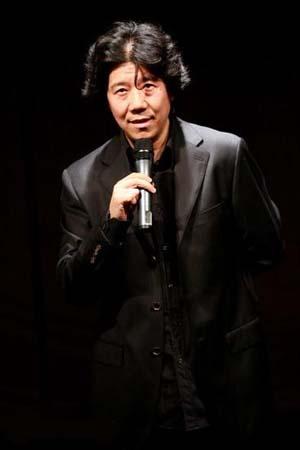theartsdesk in Beijing: Fringe Festival Goes International | reviews, news & interviews
theartsdesk in Beijing: Fringe Festival Goes International
theartsdesk in Beijing: Fringe Festival Goes International
An ambitious young festival opens its doors for the first time to foreign companies

Beijing International Fringe Festival, virtually unheard of in the UK, closed last Sunday after three weeks’ showcasing the best talent in drama, musical theatre, dance and experimental theatre in China. It was conceived in 2008 as a small local festival using university performance spaces to give voice to young directors and young talent. Back then it comprised a mere 10 productions. This year there were 54 productions in 11 venues around Beijing.
They ranged from drama and physical theatre to dance and opera; a few workshops and stage readings were also included in the programme. It has also opened its doors for the first time to non-Chinese productions and foreign theatre companies. A special connection with the Avignon Festival meant that the French presence outnumbered all others. After showcasing Chinese productions in Avignon, the Avignon Festival sent six of their best productions to Beijing. Other countries represented were Holland, Germany, Japan and one production from the UK.
 The mastermind behind the festival is Meng Jinghui (pictured right), China’s most successful theatre director and a leading figure in the avant-garde. His guiding idea is to develop new Chinese talent while opening up theatrical boundaries. His presentation to the festival emphatically said as much: “Dialogue, communication, magic thinking, charming eternity, impulsive imagination and flexible resilience - here, we live together, interact with our peers, write about our emotions, expose our feelings…”
The mastermind behind the festival is Meng Jinghui (pictured right), China’s most successful theatre director and a leading figure in the avant-garde. His guiding idea is to develop new Chinese talent while opening up theatrical boundaries. His presentation to the festival emphatically said as much: “Dialogue, communication, magic thinking, charming eternity, impulsive imagination and flexible resilience - here, we live together, interact with our peers, write about our emotions, expose our feelings…”
Like anywhere else, making theatre is an expensive and risky business in which mainstream venues vaunt financial return over artistic development. This makes festivals like this one essential for helping to keep China’s more avant-garde artists from seeking work abroad. Visual artist and choreographer Xiao Ke and artists like her whose work is highly experimental tend to perform and work mainly outside China, mainly in France and Germany.
As an outside observer it’s been interesting to note different patterns of behaviour among Beijing’s passionate young audiences, who are prone to display their appreciation (or lack of same) during a performance: it is not unusual to see members of the audience leaving a venue halfway through a show if it fails to entertain.
The festival enjoyed significant government funding, which perhaps explains why no direct social criticism was expressed in any of the productions. Most of the shows I saw are an expression of the times. As you would expect of a country that loves and worships technology and hyper-modern luxuries - most widely evident at the Olympics of 2008 - there was much reliance on projections and multimedia. Shao Zehui’s If the World Goes Blind was not alone in mixing music, singing and video projections.
This does not mean that theatre-makers are not looking to the past for inspiration. Influences and references to Western theatre are still very strong: one full section of the festival was dedicated to the theatre of Brecht - last year it was Pinter’s turn - with a staging of The Good Person of Beijing, based on The Good Person of Szechuan, a revival of Brecht’s opera The Rise and Fall of the City of Mahagonny. Aside from Brecht, there was even an attempt to revive Antonin Artaud’s bizarre and rarely staged The Cenci and an amusing danced version of Waiting for Godot.
It turns out that there are quite a few theatre companies owned and run by European expats in Beijing
Dance and physical theatre also featured prominently: the pioneering Swedish Cullberg Ballet and the Amsterdam-based Dansgroep were programmed alongside Liu Ning’s Lonely Walker, an experimental Chinese work exploring desperation and desire in a highly abstract style.
 It turns out that there are quite a few theatre companies owned and run by European expats in Beijing. The show Facehook was produced by a pan-European company, Elephant in the Room, run by Italian and Swedish nationals who have been working in the Chinese theatre scene for the last two years. Their show, presenting some interesting critical thoughts about social control, was an attempt to connect the West to the East, to appeal to both audiences, with a bilingual cast and text, and a topic, social networking, that has universal reach.
It turns out that there are quite a few theatre companies owned and run by European expats in Beijing. The show Facehook was produced by a pan-European company, Elephant in the Room, run by Italian and Swedish nationals who have been working in the Chinese theatre scene for the last two years. Their show, presenting some interesting critical thoughts about social control, was an attempt to connect the West to the East, to appeal to both audiences, with a bilingual cast and text, and a topic, social networking, that has universal reach.
It must be said that artistic quality varied between amateurishness (The Cenci) and sophistication (the adaptation of a Chinese classic, A Madman’s Diary, based on the famous novella by the father of Chinese vernacular literature Lu Xun).
 The venues used, some of them government-owned, are of a proper size (200 seats on average), and nothing like the classrooms and converted spaces of the Edinburgh Fringe. The People’s Art Experimental Theatre is in the heart of Wangfujing, not far from Tiananmen Square and the Forbidden City. The Oriental Pioneer Theatre is part of what looks like a shopping mall.
The venues used, some of them government-owned, are of a proper size (200 seats on average), and nothing like the classrooms and converted spaces of the Edinburgh Fringe. The People’s Art Experimental Theatre is in the heart of Wangfujing, not far from Tiananmen Square and the Forbidden City. The Oriental Pioneer Theatre is part of what looks like a shopping mall.
As the only British company at the festival, we found the practical constraints of putting on my play (Magical Chairs, pictured above) an arduous but interesting challenge, both technically and culturally. That was mainly down to the language barrier and lack of resources. This is not to detract from the hospitality of the volunteers, organisers and coordinators of the festival who did their utmost to respond to the needs and demands of theatre companies such as ours, who are perhaps used to rather more organisation. I suspect that these issues will gradually fade in the years to come. While one can’t compare it to the vibrancy of Edinburgh in August, what is certainly already in place is a sense of expectation, of curiosity and hunger both in the artists and the audiences.
Share this article
The future of Arts Journalism
You can stop theartsdesk.com closing!
We urgently need financing to survive. Our fundraising drive has thus far raised £49,000 but we need to reach £100,000 or we will be forced to close. Please contribute here: https://gofund.me/c3f6033d
And if you can forward this information to anyone who might assist, we’d be grateful.

Subscribe to theartsdesk.com
Thank you for continuing to read our work on theartsdesk.com. For unlimited access to every article in its entirety, including our archive of more than 15,000 pieces, we're asking for £5 per month or £40 per year. We feel it's a very good deal, and hope you do too.
To take a subscription now simply click here.
And if you're looking for that extra gift for a friend or family member, why not treat them to a theartsdesk.com gift subscription?

Add comment